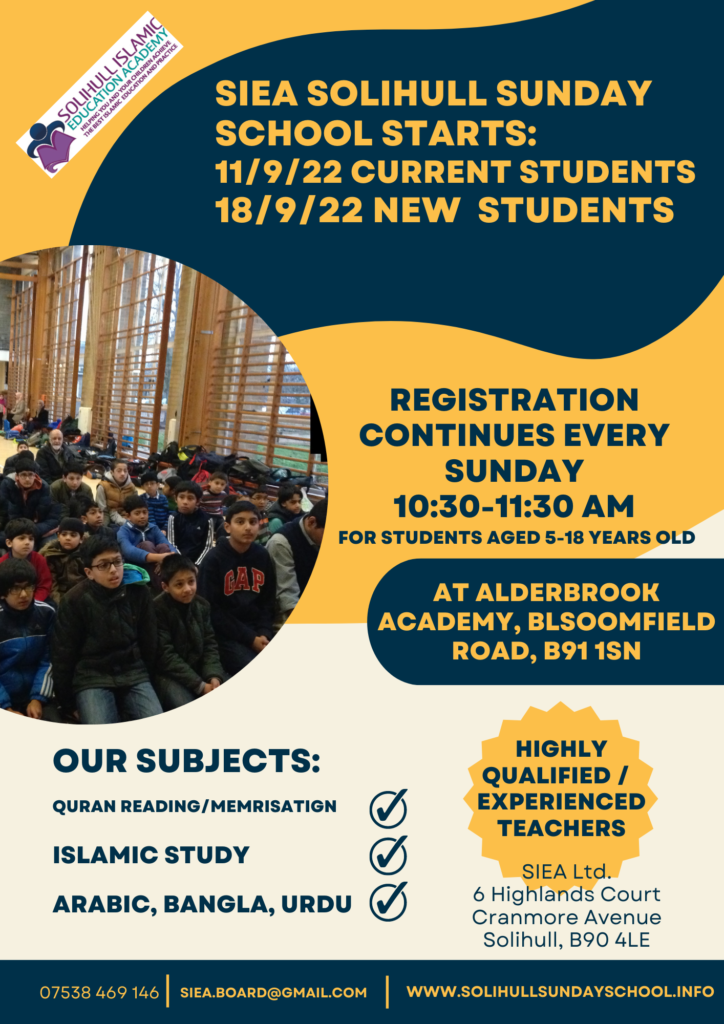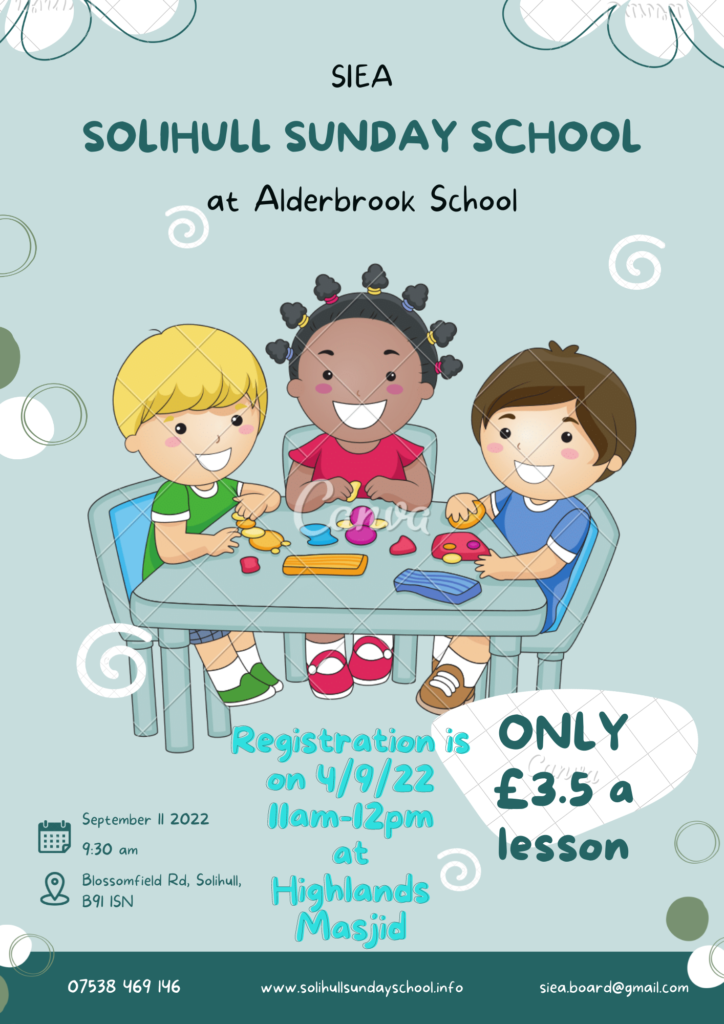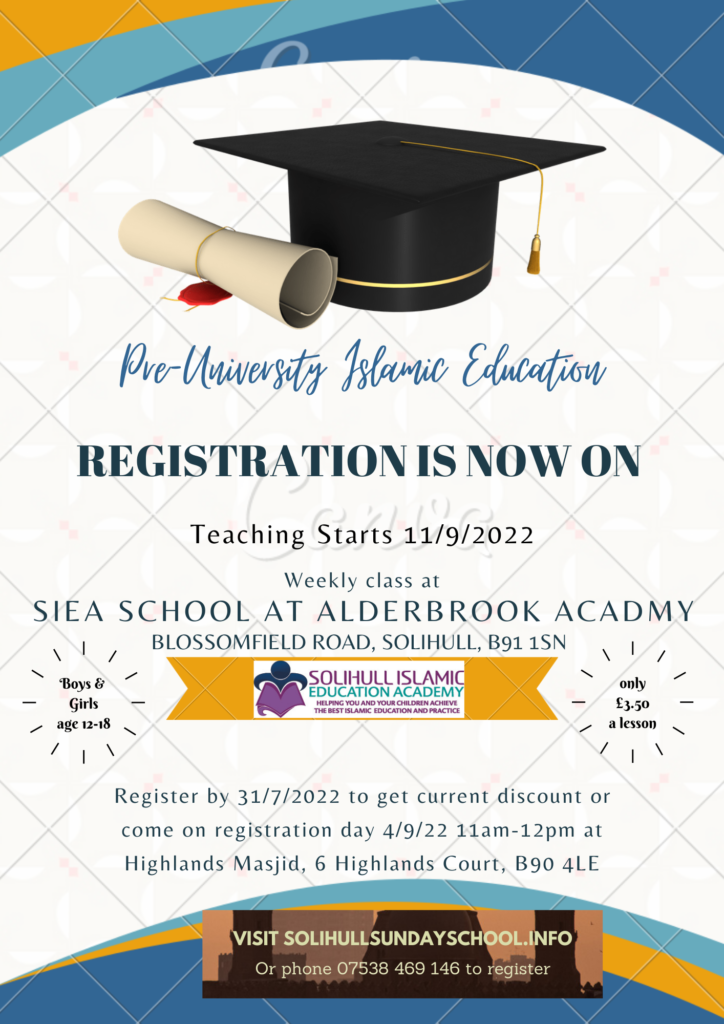School Syllabus
To read “School Syllabus Booklet ” click school syllabus
You could send us your comment (go to contact and email)
School Curriculum
“Solihull Sunday School is a weekend school that teaches a focused
set off subjects to cater for the Muslims in Solihull and neighbouring
catchments. The curriculum bridges a gap in local education and is
based around three core subject areas of Quranic Studies, Islamic
Studies and widely spoken first and second languages by the Muslim
families in the area; Arabic, Bangla and Urdu.
A pupil will typically chose one language while the other two subject
are compulsory. The school runs each and every Sunday during the
normal school year starting 9:50 am and concluding after Zuhur paryers
at 1:15pm. The lessons are divided equally in 55 minutes session with
one break time after the second period.
The teaching staff come from a mix of background and experience and
are carefully selected to meet the dynamic needs of our community in
Solihull. They are experts in the their subject matter and at the
grade they teach. The languages and Islamic studies are taught up to
GSCE level with 100% success rate at A*-C grade. This a fantastic
achievement for Solihull Sunday School.”
Solihull Sunday School is blessed to have a unique mix of teachers, some with years of experience whilst others young and dynamic with new and innovative ideas. This blend has enabled comprehensive syllabi to be assembled, which combine a solid programme for fundamentals such as Tajweed, as well as the development of new areas of teaching; such as how to tackle atheism.
Qur’anic studies
Beginners: The Arabic alphabet, how to recognise Arabic words used in the Qur’an, and memorising short surahs.
Intermediate: Learning to assemble words and read whole sentences, as well as starting to memorise longer surahs from the Qur’an.
Advanced: Continuing with memorisation of Qur’an and learning the more advanced rules of Tajweed, such as Noon Sakinah and Madd.
Islamic studies
Fiqh: Teaching the rules of the Islamic acts of worship such as ritual purification, prayer, zakaat, fasting and pilgrimage.
Aqidah: Belief in Allah, His Messengers, His Angels, His Books, the Day of Judgment and Qadr, as well as tackling atheism & other world religions.
History: The study of the life of Prophet Muhammad (peace be upon him), as well as the lives of the Prophets (peace be upon them all) throughout history.
Akhlaq: Individual behaviour and one’s relationship with God, one’s self, the family, neighbours and society in general, by purifying one’s own heart.
These areas are progressively taught up to an advanced level, culminating in GCSE Islamic studies.
Islamic Studies cater for several levels
Level 1: students aged 5-6
Level 2: students ages 7-8
Level 3: students aged 9-11
Leve 4: Student aged 12-17 (this include GCSE level and Advanced level)
Books used:
Saffar series 1-7,
Forty Hadith by Imam Nawawi,
Forty Hadith Qudsi by Imam Nawawi,
Islam by Ghulam Sarwar,
Fiqh Assunah by Sayed Sabiq,
Ed-execl GCSE books published by Pearson,
Islam do it youself GCSE by Ruqiah Maqsood,
Islam by Anees Qari,
Harun Yahya videos and books,
collection of BBC Panoramas and #4 Dispatches TV programs,
documentary videos,
videos show Islamic Empire & Islamic history
Languages – Arabic, Urdu and Bengali
Teaching students to read, write and speak their respective language.
Beginners: Alphabet, basic sentence structures and vocabulary.
Intermediate: Writing sentences and reading longer narratives, as well as expanding vocabulary and understanding grammar.
Advanced: Writing short stories and working to complete a GCSE in the language.


